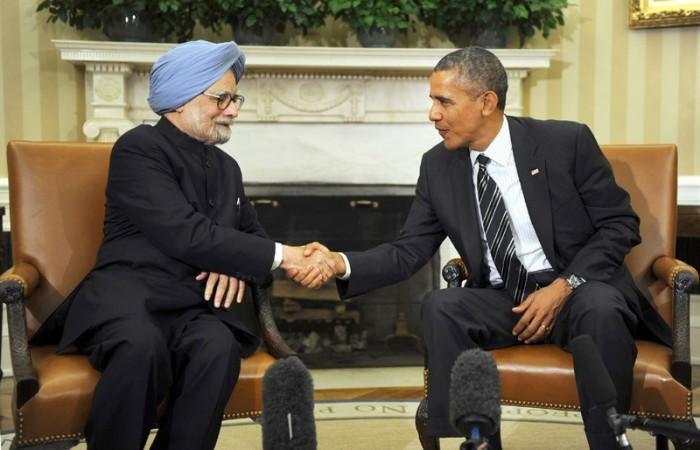
Indian Prime Minister Manmohan Singh and United Sates President Barack Obama have pledged to continue the partnership and work closely in several areas, including security cooperation, bilateral trade and investment, energy and environment, and higher education, during their Friday's meet.
The leaders gave out a joint statement after the meeting at the White House in Washington DC, highlighting the areas that need more cooporation to strengthen the strategic partnership between the two countries.
Highlights of the joint statement made by Obama and Singh:
- The leaders reaffirmed their desire to further strengthen defence trade cooperation endorsing a Joint Declaration on Defence Cooperation as a means of enhancing their partnership in defence technology transfer, joint research, co-development and co-production. Obama encouraged further participation of US firms in partnering India's efforts to enhance its defence capacities. He also welcomed India's decision to participate in the Rim of the Pacific (RIMPAC) naval exercise hosted by U.S. Pacific Command in 2014.
- Stressed the need to concentrate more on areas of security cooperation, bilateral trade and investment, energy and environment, higher education, and global architecture.
- The leaders called for expanding security cooperation between the United States and India to address 21st century challenges in the areas of counter-terrorism, cyber, space, and global health security.
- Expressed concern over the continuing threat posed by terrorism. The leaders stressed the need for joint and concerted effort, including dismantling of terrorist safe havens, disrupting all financial and tactical support for terrorism, and sharing of intelligence and information on known and suspected terrorists.
- Highlighting the increase in two-way trade by fivefold since 2001 to nearly $100 billion, the leaders agreed that there are no insurmountable impediments to bilateral trade increasing an additional fivefold.
- The Leaders reaffirmed their commitment to concluding a high-standard Bilateral Investment Treaty that will foster openness to investment, transparency, and predictability, and thereby support economic growth and job creation in both countries. The countries agreed to consider establishing a Joint Committee on Investment in Manufacturing to ensure good business environment in both countries.
- The Leaders welcomed the robust cooperation in cutting-edge scientific research and joint collaboration in science, innovation, and entrepreneurship, for the benefit of citizens in both countries. The United States welcomed the invitation by India for the United States to be Partner Country in India's Science and Technology Summit in 2014.
- Obama and Singh welcomed the announcement that the Nuclear Power Corporation of India (NPCIL) and U.S. nuclear company Westinghouse have concluded a Preliminary Contract to develop a nuclear power plant in Gujarat. They urged NPCIL, Westinghouse and General Electric-Hitachi to expedite the necessary work to establish nuclear power plants in Gujarat and Andhra Pradesh. They also reaffirm their commitment to the full and timely implementation of the India-US Civil Nuclear Cooperation Agreement.
- The leaders endorsed the proposal to launch Promoting Energy Access through Clean Energy (PEACE), an Advance Clean Energy (PACE) initiative, to rapidly deploy innovative renewable energy solutions to those who currently lack access to energy.
- Announced the establishment of an India-U.S. Climate Change Working Group to develop and advance action-oriented cooperation, as well as to begin an enhanced dialogue focusing on working closely in developing an ambitious climate change agreement for the post-2020 period, and on strengthening bilateral efforts in this regard.
- They agreed to immediately convene the India-U.S. Task Force on hydrofluorocarbons (HFCs) to discuss, inter alia, multilateral approaches and include HFCs within the scope of the United Nations Framework Convention on Climate Change (UNFCCC) and its Kyoto Protocol for accounting and reporting of emissions. They are committed to support the full implementation of the agreed outcomes under the UNFCCC with its ongoing negotiations.
- The leaders expressed their concern on high oil prices and the implications it can have on the global economy. They stressed the need to increase oil market transparency and emergency response collaboration, through closer coordination and bilateral dialogue.
- Condemning the 26 September terrorist attack in Samba in Jammu and Kashmir, the leaders reaffirmed their commitment to eliminating terrorist safe havens and infrastructure, and disrupting terrorist networks. They called for Pakistan to work toward bringing the perpetrators of the November 2008 Mumbai attacks to justice.
The leaders also touched on several topics like concerns in Afghanistan, non-proliferation cooperation, and use of chemical weapons in Syria.
(Complete Text of the Joint Statement HERE)

















